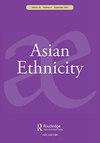Reconstruction of Ethnicity and Production of Pu’er Tea in Post-Mao China: a Case Study of Bulang Ethnic Group in Mangjing Village, Yunnan Province
IF 0.8
Q3 ETHNIC STUDIES
引用次数: 0
Abstract
ABSTRACT In post-Mao China, the Bulang ethnic group in Yunnan province use Pu’er tea cultivation as a primary way of reconstructing their ethnic identities and cultural traditions. In this paper, I argue that in the process of ethnicization, material culture is a critical factor in addition to myth, history, religions, and cultures, rooted in a historical process of forming ethnic identities, based on a six-month participant observation in Mangjing Village with local tea farmers. I further argue that the Bulang people’s reconstruction of ethnicity can be seen as an incorporation between the majority (state power) and the minority (ethnic people in frontiers) and is constituted by both external and internal factors. I also highlight that Pu’er tea functions as a particularly meaningful material agency when looking at how the Bulang people in Mangjing proactively respond to state power manipulation, mobilize social relations, and engage with a larger commercial market in the modern world.毛后中国的民族结构重建与普洱茶生产——以云南芒井村布朗族为例
本文通过对芒井村当地茶农为期六个月的参与观察,认为在民族化过程中,除了神话、历史、宗教和文化之外,物质文化也是一个关键因素,根植于形成民族认同的历史过程中。笔者进一步认为,布朗族人的族群重建可以看作是多数(国家政权)和少数(边疆民族)的结合,是由外部和内部因素共同构成的。我还强调,在观察芒井的布朗族人如何积极应对国家权力操纵、调动社会关系、参与现代世界更大的商业市场时,普洱茶是一种特别有意义的物质媒介。
本文章由计算机程序翻译,如有差异,请以英文原文为准。
求助全文
约1分钟内获得全文
求助全文
来源期刊

Asian Ethnicity
PHYSIOLOGY-
CiteScore
2.80
自引率
6.20%
发文量
27
期刊介绍:
In the twenty-first century ethnic issues have assumed importance in many parts of the world. Until recently, questions of Asian ethnicity and identity have been treated in a balkanized fashion, with anthropologists, economists, historians, political scientists, sociologists and others publishing their studies in single-discipline journals. Asian Ethnicity provides a cross-disciplinary, international venue for the publication of well-researched articles about ethnic groups and ethnic relations in the half of the world where questions of ethnicity now loom largest. Asian Ethnicity covers any time period, although the greatest focus is expected to be on the twentieth and twenty-first centuries.
 求助内容:
求助内容: 应助结果提醒方式:
应助结果提醒方式:


